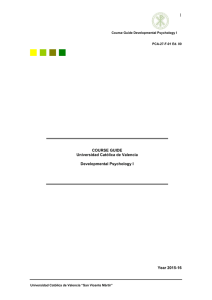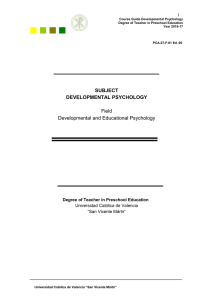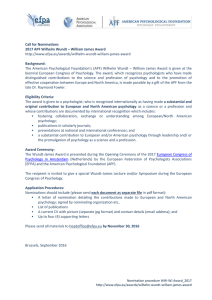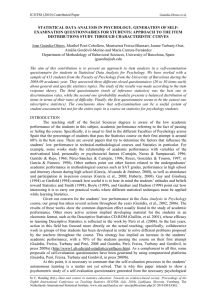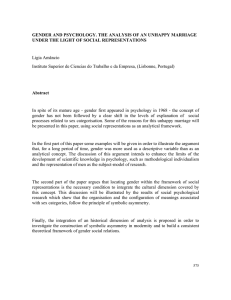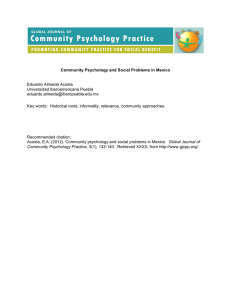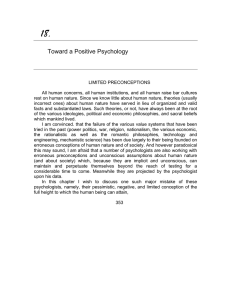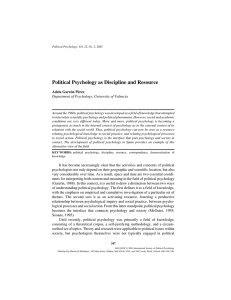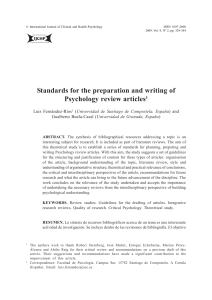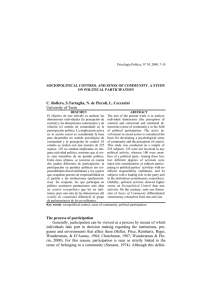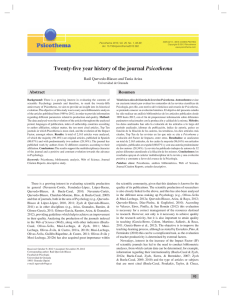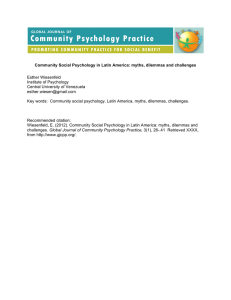teaching guide to the field educational psychology
Anuncio
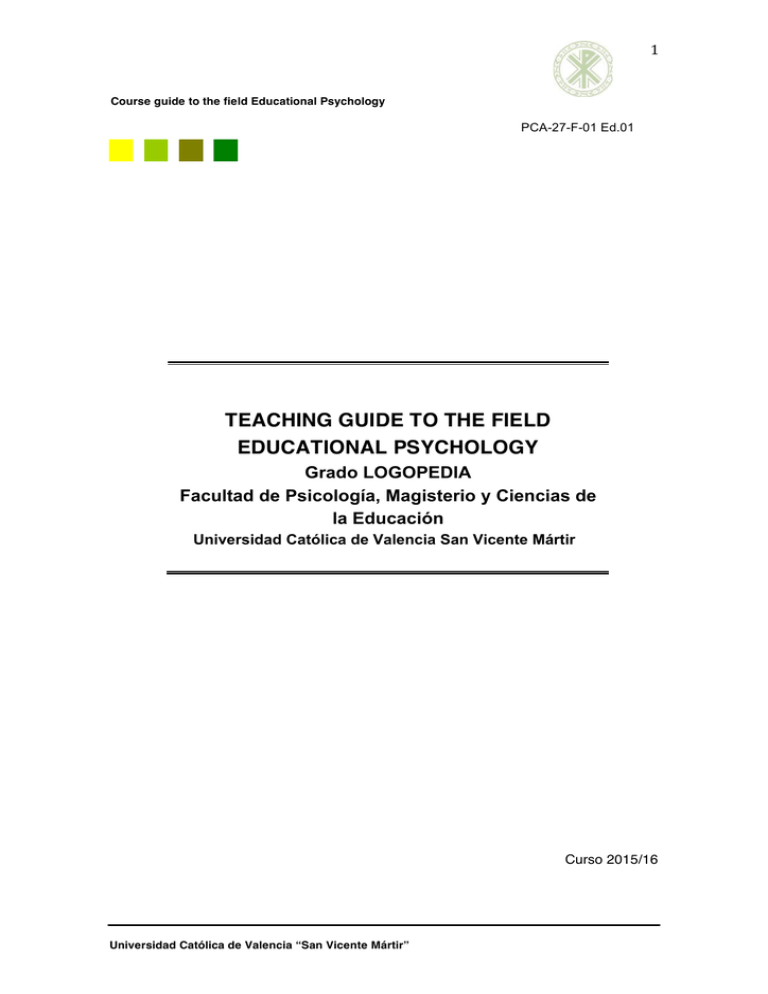
1 Course guide to the field Educational Psychology PCA-27-F-01 Ed.01 TEACHING GUIDE TO THE FIELD EDUCATIONAL PSYCHOLOGY Grado LOGOPEDIA Facultad de Psicología, Magisterio y Ciencias de la Educación Universidad Católica de Valencia San Vicente Mártir Curso 2015/16 Universidad Católica de Valencia “San Vicente Mártir” 2 PCA-27-F-01 Ed.01 Course guide to the field Educational Psychology COURSE GUIDE TO THE FIELD EDUCATIONAL PSYCHOLOGY ECTS 6 FIELD: EDUCATIONAL PSYCHOLOGY SUBJECT: PSYCHOLOGY 36 MÓDULE: BASIC FORMATION 60 CURSO: SECOND Semestre: SECOND Type of learning: Obligatory Departament: Science occupation, Developmental psychology and education TEACHER: CARMEN RICO PRIETO E-mail: [email protected] ORGANIZACIÓN DEL MÓDULO ____________________________________________________________________________ 60 ECTS BASIC FORMATION SUBJECT ANATOMY PHISIOLOGY LINGUISTICS PSYCHOLOGY Curso/ ECTS ASIGNATURA ECTS 6 Functional anatomy of the organs of speech and hearing 6 1/1 Functional anatomy of the organs of speech and hearing (2) 6 1/2 Fundamentals of Neuroscience 6 1/2 Applied linguistics for speech therapists 6 1/1 Basic psychological processes 6 1 /1 Developmental Psychology 6 1 /1 Psychology of language development 6 1 /2 Psycholinguistics 6 2/3 Research Methodology 6 2 /4 Educational Psychology 6 2 /4 12 6 36 semestre Universidad Católica de Valencia “San Vicente Mártir” 3 Course guide to the field Educational Psychology PCA-27-F-01 Ed.01 COURSE GUIDE TO: PSICOLOGÍA DE LA EDUCACIÓN Requisitos previos: Ninguno. OBJETIVOS GENERALES a. Acquire ample, comprehensive and organized conceptual schemes on the Psychology of the Education. b. Develop abilities of phenomena analysis of the educative. c. Study the different agents from the educative context. d. Know the diverse scopes of performance of the Psychology of the Education. e. Analyze and to include/understand the education like complex phenomenon, within scholastic educative contexts and nonstudents. f. Obtain positive attitudes towards questions relative to the educative phenomenon. g. Handle specific bibliographical sources of the matter. h. Expose, by means of analytical and synthetic procedures, own contents of the matter that the pupils will have to treat. i. Harness from the reflection and I engage in a dialog a critical point of view. j. Be conscious of how the educative phenomenon of the social and communitarian weave through mass media comprises. k. Now fundamental the epistemologic and methodologic aspects the Psychology of the Education. l. .Know and to compare the theoretical contributions of eminent authors in Psychology of the Education. m. Learn to apply to the theoretical knowledge to the practical situations of education learning. n. Value the importance of the interpersonal factors intra and in the educative situation. o. Integrate the pertinent information to obtain a complete evaluation of the education process/learning. p. Value the experiences in the classroom to be able to innovate the educative practice. Universidad Católica de Valencia “San Vicente Mártir” 4 PCA-27-F-01 Ed.01 Course guide to the field Educational Psychology CROSS-­‐SECTIONAL COMPETENCES (CC) Ponderación de la competencia 1 2 3 1. Analysis and synthesis 4 X 3. Find, evaluate, organize and manage information systems. X 4. Speaking and writing fluently, appropriately and with the necessary consistency to meet the academic standards of correctness in the language of instruction 5. Make decisions and being responsibile for them. 7. Critically evaluate own job performance and that of other professionals to improve results 12. Having an open and flexible attitude to lifelong learning. X X X X SPECIFIC COMPETENCES (SC) 1 2 15. Understand and integrate the psychological foundations of Speech: language development, psychological development, Neuropsychology of language, basic processes and Psycholinguistics 18. Understand and integrate the educational foundations of Speech: The processes of teaching and learning. 45. Use technologies of the information and the communication LEARNING OUTCOMES 3 4 X X X COMPETENCES LO1. Understand the concept of education and to have an integral vision of educative psychology in the contexts of formal and informal education. CC:1, 3, 4, 5, 7, 12, LO2. Describe the educative phenomenon from the Psychology of the Education. CC:1, 3, 4, 5, 7,12, LO3. Know the tasks and functions the psicoeducativa intervention CC:1, 3, 4, 5, 7, 12, SC:15, 18, 45 LO4. Apply the contents to diverse educative contexts. CC:1, 3, 4, 5, 7, SC:15, 18, 45 SC:15, 18, 45 SC:15, 18, 49 Universidad Católica de Valencia “San Vicente Mártir” 5 Course guide to the field Educational Psychology PCA-27-F-01 Ed.01 LO5. Eflect on the possibilities and difficulties concretely of introducing the effective perspective in the different educative contexts and in the present scholastic system. CC:3, SC:15, 18, 45 LO6. Look for bibliographical information for the elaboration of the different contents proposed in the subjet. CC:1, 3, 4, 7 LO7. Work in equipment and to collaborate effectively with other people. CC:1, 3, 4, 5, 7, 12 LO8. Apply to the theoretical contents to the practice of evaluation and psicoeducativa intervention. CC:1, 3, 4, 5, 7, 12 LO9. Elaborate picopedagógicos information. CC:1, 3, 4, 5, 7, 12, SC:15, 18, 45 Universidad Católica de Valencia “San Vicente Mártir” 6 PCA-27-F-01 Ed.01 Course guide to the field Educational Psychology ON-­‐CAMPUS EDUCATIONAL ACTIVITIES ACTIVIDADES FORMATIVAS DE TRABAJO PRESENCIAL ACTIVITY Teaching-­‐Learning Methodology Relationship With Learning Relationship With Outcomes for the competences subject Teacher presentation of contents, analysis of competences, explanation and in-­‐class display of skills, abilities and knowledge. LO1, LO2, LO3, LO4, LO5, LO6. CC:1, 3, 4, 5, 7,12, SC:15, 18, 45 1 PRACTICAL CLASSES Group work sessions supervised by the professor. Case studies, diagnostic tests, problems, field work, computer room, visits, data search, libraries, on-­‐line, Internet, etc. Meaningful construction of knowledge through interaction and student activity. LO7, LO8, LO9. CC:1, 3, 4, 5, 7,12, SC:15, 18, 45 0,90 OFFICE ASSISTANCE Personalized and small group attention. Period of instruction and/or orientation carried out by a tutor to review and discuss materials and topics presented in classes, seminars, readings, papers, etc. ON-­‐CAMPUS CLASS ASSESSMENT Set of oral and/or written tests used in initial, formative or additive assessment of the student 0,30 LO3, LO4, LO7, LO8, LO9. CC:1, 3, 4, 5, 7,12, SC:15, 18, 45 LO1, LO2, LO3, LO4, LO5, LO6, LO7, LO8, LO9. CC:1, 3, 4, 5, 7,12, SC:15, 18, 45 TOTAL ECTS 0,20 2,4 Universidad Católica de Valencia “San Vicente Mártir” 7 Course guide to the field Educational Psychology PCA-27-F-01 Ed.01 INDEPENDENT WORK ACTIVITIES ACTIVITY Teaching-­‐Learning Methodology GROUP WORK Group preparation of readings, essays, problem solving, seminars, papers, reports, etc. to be presented or submitted in theoretical lectures, practical and/or small-­‐group tutoring sessions. Work done on the university e-­‐learning platform ( www.plataforma.ucv.es ) Relationship With Learning Relationship With Outcomes for the competences subject ECTS LO1, LO2, LO3, LO4, LO5, LO6, LO7, LO8, LO9 CC:1, 3, 4, 5, 7, T12, SC:15, 18, 45 1.2 LO1, LO2, LO3, LO4, LO5, LO6, LO7, LO8, LO9 CC:1, 3, 4, 5, 7, T12, SC:15, 18, 45 2,4 TOTAL 3.6 INDIVIDUAL WORK Student study: Group Individual preparation of readings, essays, problem solving, seminars, papers, reports, etc. to be presented or submitted in theoretical lectures, practical and/or small-­‐group tutoring sessions. Work done on the university e-­‐learning platform ( www.plataforma.ucv.es ) Universidad Católica de Valencia “San Vicente Mártir” 8 PCA-27-F-01 Ed.01 Course guide to the field Educational Psychology SYSTEM FOR ASSESSING THE ACQUISITION OF THE COMPETENCES AND ASSESSMENT SYSTEM Assessment Tool LEARNING OUTCOMES ASSESSED Final test of the theoretical contents (it is necessary to surpass this section with 3 points). R1, R2, R3, R4, R5 Allocated Percentage 60% Practical group work of evaluation and intervention (it is 30% R6, R7, R8, R9 necessary to surpass this section with 1.5 points) Attendance to class and 10% delivery of practical activities when finalizing R1, R2, R3, R4, R5, R6, R9 each session. Additional information: IT IS NECESSARY TO SURPASS EACH ONE OF THE EVALUATION BLOCKS TO BE ABLE TO MAKE THE AVERAGE OF ALL OF THEM. IF THE ONE OF THE BLOCKS SUBJET IS SUSPENDED IT WILL BE SUSPENDED. MENTION OF DISTINCTION: The grade will be granted to those students who have attained a grade of 9,5 and have proven high proficiency in the language Universidad Católica de Valencia “San Vicente Mártir” 9 Course guide to the field Educational Psychology PCA-27-F-01 Ed.01 DESCRIPTION OF CONTENTS 1. Concept of educational psychology 1. Educational psychology as science. 2. Psychoeducational assessment 2. Agents of the educational situation 1. The teacher. 2. The student. Academic motivation. 3. Self-­‐regulated learning. 3. The state of education in action 1. Attention-­‐Deficit Hyperactivity Disorder. 2. Emotional education. 3. The classroom environment. COMPETENCES C1, 7, 12, S15 C1, 7, 12, S15, 18 C1, 3, 4, 5, 7, 12, S45 TEMPORAL ORGANIZATION OF LEARNING: CONTENT/TEACHING UNIT # OF MEETINGS 1 1. Concept of educational psychology 6 2 2. Agents of the educational situation 15 3 3. The state of education in action 9 *Each block corresponds to a teaching unit. The sessions are indicative and depend on the pace of learning and the needs of students and teaching dynamics, and the inclusion of new activities during the course of the field Universidad Católica de Valencia “San Vicente Mártir” 10 PCA-27-F-01 Ed.01 Course guide to the field Educational Psychology REFERENCES ALVAREZ, L., GONZÁLEZ-PIENDA, J.A., NUÑEZ, J.C Y GONZÁLEZ-CASTRO (2007). Prácticas de psicología de la Educación. Evaluación e intervención psicoeducativa. Madrid: Pirámide. BADIA, A., MAURI, T. Y MONEREO, C. (2004). La práctica psicopedagógica en educación formal. Barcelona: UOC. BELTRÁN, J. Y BUENO, J.A. (1995). Psicología de la educación. Barcelona: Marcombo. BURON, J. (1993): Enseñar a Aprender: Introducción a la Metacognición. Bilbao: Mensajero CARRETERO, M. (1993): Constructivismo y Educación. Zaragoza: Edelvives. COLL, C. y cols. (1992). Los contenidos en la reforma. Madrid: Santillana. COLL, C., MARTIN, E., MAURI, T. y cols. (1993): El Constructivismo en el Aula. Barcelona: Graó. COLL, C., PALACIOS, J. y MARCHESI, A. (2001). Desarrollo psicológico y educación 2. Psicología de la educación escolar. Madrid: Alianza. COLL, C., MIRAS, M., ONRUBIA, J. Y SOLÉ, I. (1998). Psicología de la Educación. Barcelona: Edhasa. DOMÉNECH, B. (2007). Psicología de la educación e instrucción: su aplicación al contexto de la clase. Castellón de la Plana: Universitat Jaume I. GALLIFA, J. (1990). Models cognitius de l'aprenentatge. Barcelona: Raima. GONZÁLEZ-PIENDA, J.A., GONZÁLEZ, R., NUÑEZ, J.C. Y VALLE, A. (2002). Manual de Psicología de la Educación. Madrid: Pirámide. GONZÁLEZ, E. Y BUENO, A. (2004). Psicología de la educación y del desarrollo en la edad escolar. Madrid: CCS. HERNANDEZ, F., y SANCHO, J.M. (1993): Para enseñar no basta con saber la asignatura. Barcelona: Paidón NISBET, J. y SCHUCKSMITH, J. (1987). Estrategias de aprendizaje. Madrid: Santillana. PENNAC, D. (2007). Mal de escuela. Barcelona: Literatura Mondadori WOOLFOLK, A.E. (1999). Psicología Educativa. México: Prentice Hall. Universidad Católica de Valencia “San Vicente Mártir”
